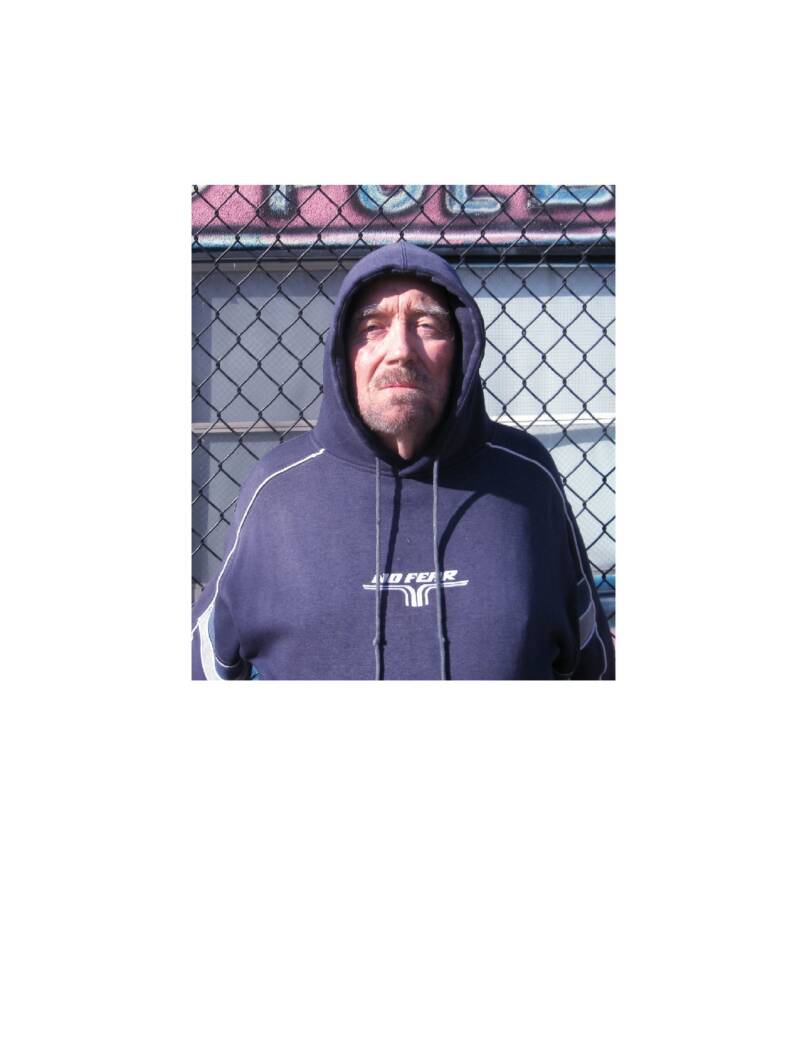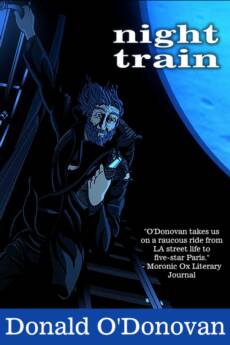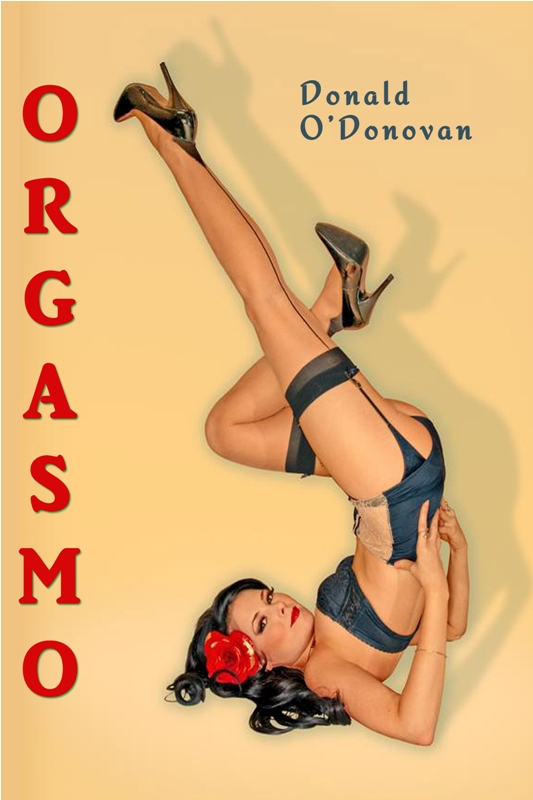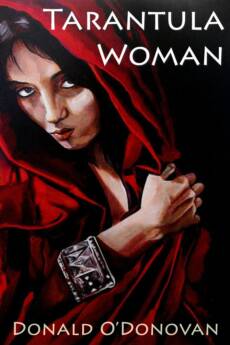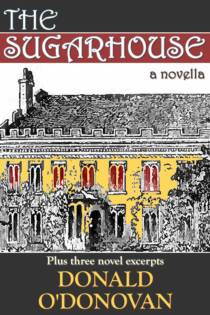Interview
©Moronic Ox Literary Journal - Escape Media Publishers / Open Books
Moronic Ox Literary and Cultural Journal - Escape Media Publishers / Open Books Advertise your book, CD, or cause in the 'Ox'
Novel Excerpts, Short Stories, Poetry, Multimedia, Current Affairs, Book Reviews, Photo Essays, Visual Arts Submissions
Donald O'Donovan, author of the recently published novel, Night Train, was born in Cooperstown, New York. A teenage runaway, O’Donovan rode freights, traveled the US, joined the army to get off the street, lived in Mexico, and worked at more than two hundred occupations including long distance truck driver, undertaker and roller skate repairman. The first draft of Night Train was written on twenty-three yellow legal pads while the author was homeless in the streets of LA.
Today, Donald O’Donovan is an optioned screenwriter and voice actor with film and audio book credits. He recently narrated the documentary film, The Forgotten, produced and directed by Sarem Yadegari. His screenplay, Cutter’s Woods, is a semi-finalist in the 2009 FilmStream Screenplay Competition.
Here's what Donald O'Donovan had to say to Moronic Ox just after the publication of Night Train.
Moronic Ox: Thank you for joining with us, Donald, to share a bit of yourself with the Moronic Ox audience. And congratulations on your new novel, Night Train.
O'Donovan: Thank you for the opportunity to shake a few hands and kiss a few babies. To tell the truth, this is a scenario I always envisioned but one I feared would never play out.
Moronic Ox: I know this is probably the last question a literary writer wants to hear, but it is, these days, one of the first that begs to be asked: What genre does Night Train fall into?
O'Donovan: The picaresque novel...which Wikipedia defines as a first-person narrative, relating the adventures of a rogue or low-born adventurer (Spanish pícaro) who lives by his or her wits in a corrupt society. It happens that the picaresque novel is not currently in vogue, so it may appear that I’m trying to do something radical and break the mold, but nothing could be farther from the truth. The picaresque novel is one of the oldest forms of literature and goes all the way back to Petronius, First Century AD, so I’m actually part of a longstanding tradition.
Moronic Ox: Night Train is a decidedly autobiographical novel: you make neither pretense nor excuse for that. Why have you chosen such a highly personal approach and style for your novel about homelessness?
O'Donovan: I write about my own experience because it’s what I know. Creating imaginary characters and incidents doesn’t appeal to me. Moving pieces around on a chessboard is too removed. I need to be up there in the action. Plus my kind of writing is basically therapeutic. It’s a catharsis. You unburden yourself, you get it out there on the page where you can deal with it.
Moronic Ox: What writers are your major influences?
O'Donovan: I started out with Dickens and Dostoevsky and Joseph Conrad, especially Conrad because he didn’t begin writing until he was forty and had retired for medical reasons from a career as the captain of a Polish merchant vessel which in the age of sail was very dangerous and took him all over the world. So Conrad really had something to write about and he wrote from his own experience, he didn’t make something up, and that’s very important to me. When we come to the Americans there was Whitman, of course, and Miller, Kerouac, William S. Burroughs and then the French criminal authors such as Genet (The Thief’s Journal) and Henri Charriere who wrote Papillon, and finally, Celine (Journey to the End of the Night), who, for my money, is the writer of the twentieth century.
Moronic Ox: In your novel you compare LA to Calcutta, saying it is one of the few places one can eat a luxury meal in a grand hotel then walk onto the street and watch somebody die. Is the City of Los Angeles actually a character in Night Train?
O'Donovan: Yes. I call LA the world’s most dynamic and demonic city. I’ll put LA alongside of Paris any day as a cradle for the artist. They’re very different cities, of course, but LA is very fertile. In LA the beauty and tragedy are right in your face. You go downtown, for example, and here are these magnificent buildings, shimmering glass towers reflecting each other, and on the sidewalk there’s this medieval squalor with ragged dirty people living in cardboard boxes. And that’s very fertile, very motivating for the writer.
Moronic Ox: So, Night Train is wholly based on your personal experience, correct?
O'Donovan: Yes, I was homeless. There were two periods, actually: the 2007 to 2009 period, which is the scope of the book, and earlier during the time of the riots and the earthquakes. I think it was 1995. I was homeless at that time. The Rodney King period. I collapsed the time frame and pushed those two periods together, moved the '95 period up to the 2009 period.
Moronic Ox: But certainly some of the rather amazing scenes depicted in Night Train must be imaginary...
O'Donovan: The characters and incidents are all real, taken directly from my experience. I’ve changed the names of the characters, of course. I’ve embellished and embroidered some of the incidents. It wouldn’t be much fun otherwise.
But the characters are all based on real people I’ve known. I’m still in touch with some of them, in fact. The lady I call Polly Pink Shoes, for example. She just got out of a rehab, she’s on Paxil and she’s writing a screenplay. The only purely imaginary incident is when my character gets a reward from the Cosa Nostra guy—I’ve forgotten his name—for rescuing his child. I did get a windfall—a settlement from an accident (which was what put me in the street in the first place) and I did go to Paris, but I didn’t get the money from the gangster. That was imaginary.
Moronic Ox: What would you like readers to take away from the experience of reading Night Train?
O'Donovan: Some laughs, I guess. I consider my work to be mainly comedic. And an appreciation of what it is like to be homeless and poor, and more importantly, what their civilization looks like to folks who are camping on the edge of it. I’d like to see a world where the luxury and privilege of the few is not predicated on the misery and poverty of the many.
Moronic Ox: Why did you choose Open Books as your publisher?
O'Donovan: Actually, they chose me. I found them on the Internet and just submitted Night Train as per instructions. They wrote back and asked to read the entire manuscript and it went forward from there. Before connecting with Open Books, though, I spent twenty years trying to batter down the walls of the monolithic New York publishers. Recently I got a letter from an editor of one of the big publishers who said, "I look at a lot of manuscripts and yours jumped out. I was enthralled…" And so forth… Then, down at the bottom: "Unfortunately, we can’t think of publishing this because it’s not a commercially viable mainstream work." And at that moment I said, 'I’m over it', and I turned to the Internet. I mean, it doesn’t matter how good your work is. It’s not about that. You could polish it until it shines like the Hope Diamond, and they’re still not going to take it unless it’s commercially viable and the rest of it. My editor at Open Books let the genie out of the bottle, and I’m grateful. I’m getting a hearing at last. A writer needs readers. The reader is an essential part of the equation. The circuit has to be completed. Otherwise, you’re just pissing out a window…
Moronic Ox: What’s next for you?
O'Donovan: Confessions of a Bedbug Hauler is another picaresque autobiographical novel. This time the antihero is a truck driver. I did three years OTR, forty-eight states and Canada, for Schneider National. For those who don’t know, “bedbug hauler” is trucking industry slang for furniture mover, and bedbug haulers are held in low esteem by some drivers because they have to unload. The company drivers, Schneider, England, JB hunt and so on, operate on a drop and hook basis. You drop your trailer at your destination and pick up another one and away you go. You don’t touch the freight, and those who do are looked upon as second class citizens.
Moronic Ox: What is your writing process?
O'Donovan: There’s two parts to it. First it’s the word vomit, non-stop gush bit. You just get it out, any old way… For this you want the words to be in your fingers, not in your head. The second stage is completely different. You’re cold, calculating, crisp, ruthless. That’s the editing stage. You go over what you’ve done and you throw this out and you throw that out and you take what’s left and work with it—revise, revise, revise. It’s like filmmaking. First you shoot the film, then you take your footage to the edit room and you cut it together. I always work on two or three projects at the same time. That way one can be cooling off and then I go back and edit that one, and sometimes the books cross pollinate one another, sort of, or the characters will migrate from one book to another, and that’s where you sometimes get your “happy accidents.”
Moronic Ox: I know that everyone at the Ox, and at Open Books, wishes you all the success possible with Night Train, and we would also like to thank you for spending a little time with us to tell us about the book and about yourself. Night Train is a very challenging novel—not for the faint of heart or those who would choose to deny that which is obvious and right in front of us each and every day—and we commend you for your bravery 'in the field', so to speak, but also for your commitment to this story and this cause. Surely, it is an important one.
O'Donovan: Thank you for the opportunity to speak up about Night Train and about my life. Hopefully, I've gotten it right...
*Publisher' note: Night Train is available in ebook only. Click here to download all formats including PC, iphone, PDF, Nook, Sony Ereader & Amazon Kindle.
Books by
Donald O'Donovan
